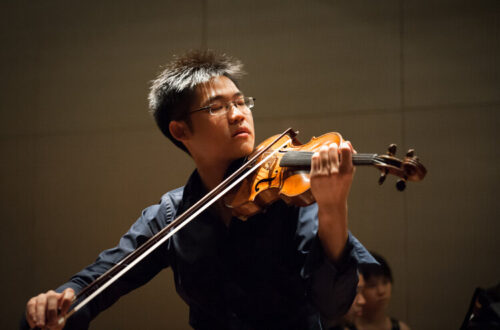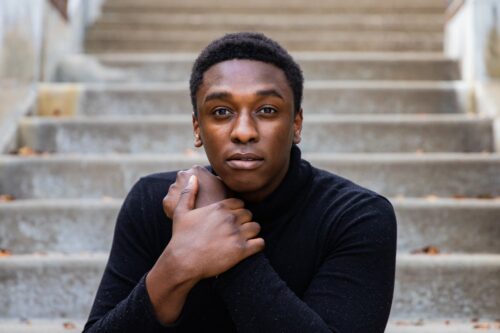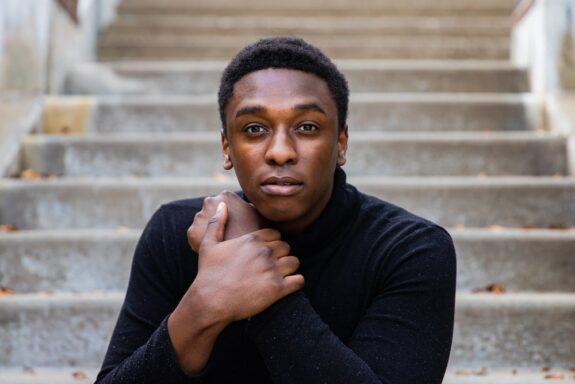 United States Mozart, Bologne, Haydn – ‘Classical Sparks’: Alan Choo (violin), Jonathan Pierce Rhodes (tenor), Apollo’s Fire / Jeannette Sorrell (conductor). First United Methodist Church, Akron, 27.2.2025. (MSJ)
United States Mozart, Bologne, Haydn – ‘Classical Sparks’: Alan Choo (violin), Jonathan Pierce Rhodes (tenor), Apollo’s Fire / Jeannette Sorrell (conductor). First United Methodist Church, Akron, 27.2.2025. (MSJ)

Mozart – Overture to La finta semplice; Violin Concerto No.3 in G major; ‘Amici miei . . . Il mio tesoro’ from Don Giovanni
Bologne – Selections from L’amant anonyme
Haydn – Symphony No.8 in G major, ‘Le soir’
A rare outing by Apollo’s Fire in a full classical program, as opposed to their more typical baroque fare, is to be treasured, particularly when it is capped by a glorious performance of an early Haydn symphony almost never encountered in concert in this region. Haydn wrote a trio of symphonies on the theme of morning, noon and night, and this concert brought forth the last of these in a performance that savored the sheer joy of Haydn’s invention.
From the pop-song setting of the first movement (almost giddy in its antics) to the rich solo opportunities for section leaders in the songful slow movement, to the perky minuet with its delightful double bass solo (played here with agile wit by Sue Yelanjian), to the genial tempest of the finale, the performance made one long for more Haydn opportunities from Apollo’s Fire.
The expanded ensemble – seven first violins, six second violins, four violas, four cellos and two double basses, joined by two horns, flute, two oboes and bassoon – lived up to their vaunted standards of adept, lithe and expressive performance. Sorrell shaped the piece with a sure feel for the work’s overall trajectory, showing why she is becoming so heavily in demand for what one might call ‘stand-up’ conducting, as opposed to leading from the keyboard as she so often does in baroque programs. Let us hope for more Haydn from this team in the near future.
Hardly less engaging was Mozart’s Violin Concerto No.3, featuring Alan Choo as poised soloist. Normally the ensemble’s concertmaster (as he was in the second half of the concert), Choo demonstrated his skill at stepping out as soloist while still frequently keeping an eye on other players and engaging with them to keep the sense of the violin in musical dialogue with the orchestra. Choo sought out the operatic feel of the slow movement, evoking a vocal, aria-like style, even daring to use portamento between some notes, as a singer might. The effect cast a spell and brought new life to a familiar favorite. Choo then dove into the adventures of the contrasting sections of the finale with equal commitment, joined every step of the way by Sorrell and the ensemble. My previous encounters with this concerto live in concert have been only modern instrument versions. The flexibility, luminosity and color of this performance will make it hard to go back to less accommodating ‘big band’ versions.

Tenor Jonathan Pierce Rhodes was featured in the dramatic recitative and aria ‘Il mio tesoro’ from Mozart’s Don Giovanni, and in the mellifluous aria ‘Depuis longtemps’ from the opera L’amant anonyme by Joseph Bologne, the Chevalier de Saint-Georges, often known today as ‘the Black Mozart’. New attention has come to Bologne in recent years, restoring him to posterity’s attention after he was largely erased during the Napoleonic era due to both his race and his royalist leanings. It is good to hear his music back in the canon although, like most composers of the Classical era, he falls short of the wit of Haydn or the emotion of Mozart. But his music is shapely and elegant, elements that Rhodes conveyed with lyrical poise. He sings in the tenor range, but it is a rare voice in how baritonal the shading is, bringing a gravity to counter the sweetness in the Bologne aria and a powerful heft to the more dramatic Mozart. The range displayed in these two arias, as well as the singer’s vivid stage presence, whets the appetite to hear more of his work. The Bologne is for the character Valcour in L’amant anonyme, a role which Rhodes will be performing in full with the Finger Lakes Opera.
Further fleshing out the picture of Bologne was a pair of gavottes from the same opera which quickly gelled after a bumpy start, proving that even Apollo’s Fire is human. Similar galant charm was brought to their performance of the overture the Mozart opera La finta semplice, astonishingly accomplished for a twelve-year-old composer.
The only disappointment is the fact that Apollo’s Fire, its director and all its associated musicians are too busy to give us even more concerts, considering that they have grown to cover everything from music of the Renaissance and even the occasional medieval outing all the way up through the Classical period, a range of over five hundred years of music. One can hardly want less of one area in order to get more of something else when they accomplish such a stellar level of realization and communication in performance…
Except for more Haydn. We always need more Haydn.
Mark Sebastian Jordan
